Getting to Baltimore (and Artscape) with a bike
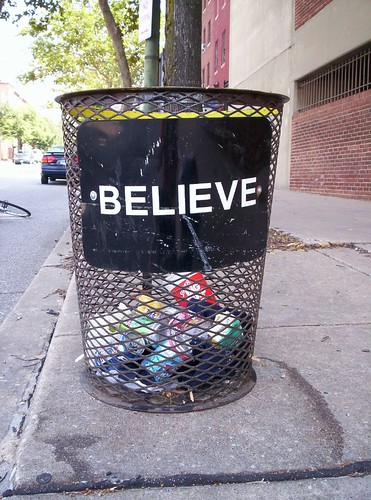 Evidence of Mayor O'Malley's Believe campaign.
Evidence of Mayor O'Malley's Believe campaign.On Friday I went to Baltimore to see Artscape, the big street art fair.
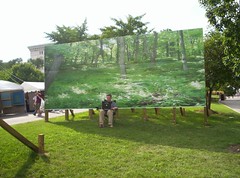 By Audrey Lea Collins. Wood, vinyl and corrugated platic billboard depicting the view from her backyard in upstate New York.
By Audrey Lea Collins. Wood, vinyl and corrugated platic billboard depicting the view from her backyard in upstate New York.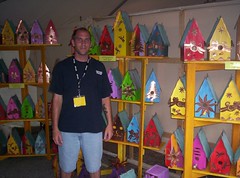
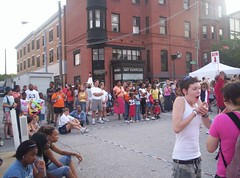 People watching the Kangaroo Kids jump ropers from Howard County.
People watching the Kangaroo Kids jump ropers from Howard County.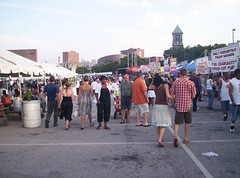 On the Food Court, which also included corporate exhibits like the HP+You huge tented exhibit, free samples from Haagen-Dazs, a music stage, and a lot of "festival food."
On the Food Court, which also included corporate exhibits like the HP+You huge tented exhibit, free samples from Haagen-Dazs, a music stage, and a lot of "festival food."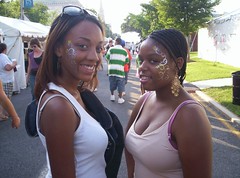 Face painting is always popular.
Face painting is always popular.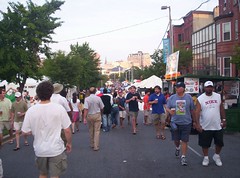
Because I wanted to go see a couple neighborhood commercial districts beforehand, I decided that I wanted to take my bike. Because MARC commuter trains don't allow bikes, I did this by taking the subway to Greenbelt, the connecting bus to BWI Airport, and the Light Rail from the Airport to Baltimore.
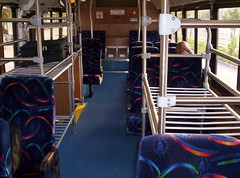 Like all Metrobuses, the B30 has a front-mounted bike rack capable of carrying two bicycles. Unlike most Metrobuses, the B30 buses are equipped with incredibly comfortable seats, making it the only Metrobus I can read on without getting a stomach ache. This bus runs to and from the Greenbelt Metro Station and BWI Airport.
Like all Metrobuses, the B30 has a front-mounted bike rack capable of carrying two bicycles. Unlike most Metrobuses, the B30 buses are equipped with incredibly comfortable seats, making it the only Metrobus I can read on without getting a stomach ache. This bus runs to and from the Greenbelt Metro Station and BWI Airport.Upon arrival, I breakfasted at Lexington Market
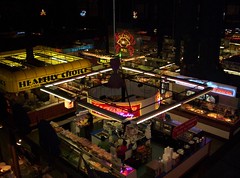 Overview of Lexington Market interior from a 2nd floor catwalk.
Overview of Lexington Market interior from a 2nd floor catwalk.and rode around to Old Goucher, Charles Village, Waverly, and Hampden, and then I went to Artscape, which opened at noon, although I probably didn't get there til about 3 pm.
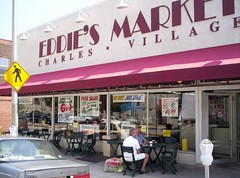 Eddie's Market in Charles Village relies on prepared foods, has a congenial outdoor seating section, and offers delivery. To me, its outdoor seating section is a lot nicer than Whole Foods Market on P Street in DC. Within the next year, the Johns Hopkins student bookstore is going to move to a location about a block away.
Eddie's Market in Charles Village relies on prepared foods, has a congenial outdoor seating section, and offers delivery. To me, its outdoor seating section is a lot nicer than Whole Foods Market on P Street in DC. Within the next year, the Johns Hopkins student bookstore is going to move to a location about a block away.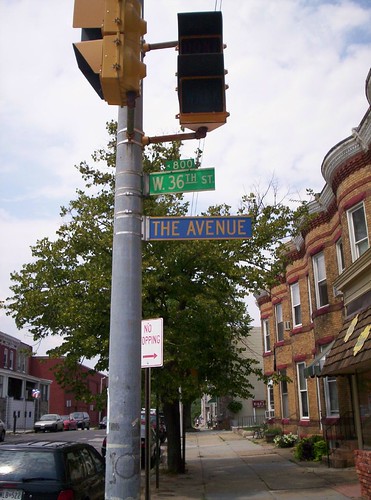 Hampden's 36th Street is referred to as "The Avenue" and is known for Cafe Hon, Baltimore Hon Culture, and Atomic Books, where I spent a fair amount of time reading zines and graphic novels. (This is a nice use of complementary-supplemental street signs to demark a district.)
Hampden's 36th Street is referred to as "The Avenue" and is known for Cafe Hon, Baltimore Hon Culture, and Atomic Books, where I spent a fair amount of time reading zines and graphic novels. (This is a nice use of complementary-supplemental street signs to demark a district.)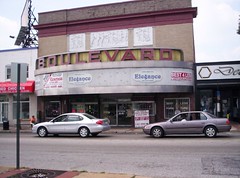 Waverly is a commercial district with some similarities to H Street.
Waverly is a commercial district with some similarities to H Street.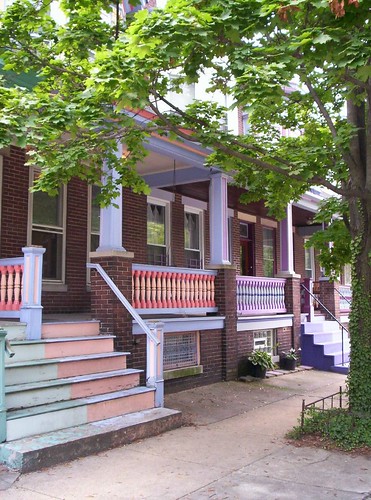 Decorative house painting in Charles Village.
Decorative house painting in Charles Village.Going to Baltimore this way costs a bit more than taking the commuter train, and it takes longer, especially if you don't hit the connections just right. (During rush this is $2.90 from Union Station on the subway, $3 to the airport on the B30, and $1.50 on the Light Rail. On the return the subway is a bit cheaper, $2.35.)
But I was able to see a lot more of Baltimore than I would have been able to had I been reliant on their less frequent bus system. So the time tradeoff paid off on the other end. Plus, you can get to Baltimore this way on the weekends, when otherwise Amtrak is the only direct rail option, but Amtrak costs ($29) more than twice the cost of the MARC train ($13/round trip).
While you see a fair number of bikers in DC, I saw very few in Baltimore, except around Hampden.
Supporting multiple and complementary transportation modes is the way to go.



0 Comments:
Post a Comment
<< Home